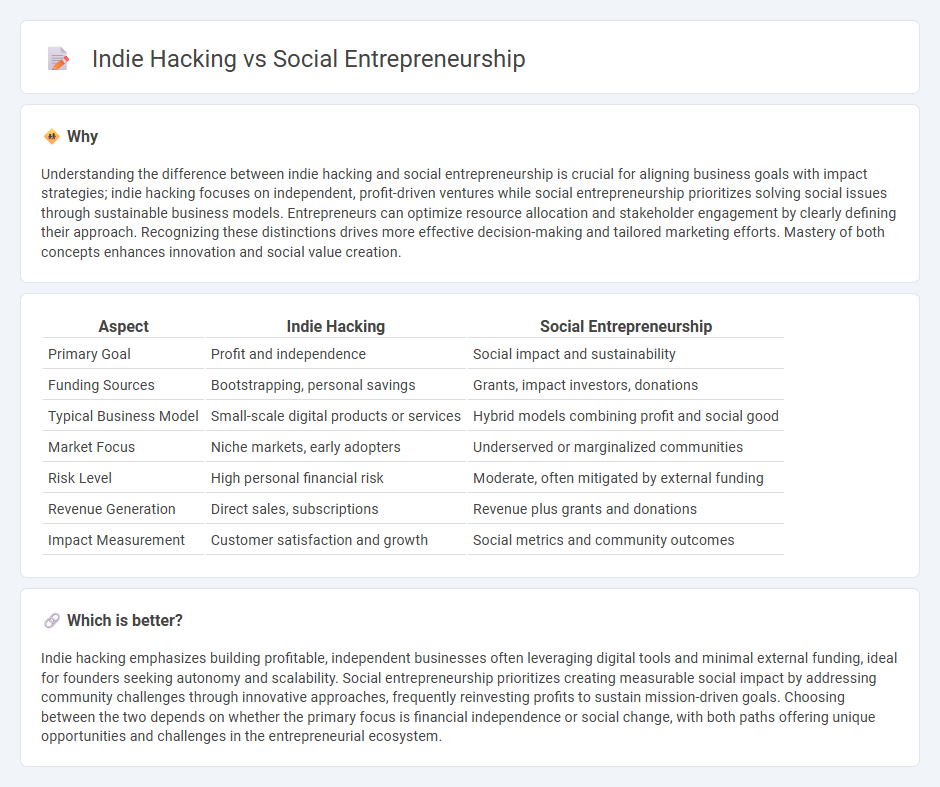
Indie hacking focuses on solo founders building profitable, scalable businesses through innovative tech solutions and lean startup principles. Social entrepreneurship prioritizes creating social impact by addressing community issues and sustainable development goals while maintaining financial viability. Explore the distinct strategies and goals shaping these dynamic entrepreneurial paths.
Why it is important
Understanding the difference between indie hacking and social entrepreneurship is crucial for aligning business goals with impact strategies; indie hacking focuses on independent, profit-driven ventures while social entrepreneurship prioritizes solving social issues through sustainable business models. Entrepreneurs can optimize resource allocation and stakeholder engagement by clearly defining their approach. Recognizing these distinctions drives more effective decision-making and tailored marketing efforts. Mastery of both concepts enhances innovation and social value creation.
Comparison Table
| Aspect | Indie Hacking | Social Entrepreneurship |
|---|---|---|
| Primary Goal | Profit and independence | Social impact and sustainability |
| Funding Sources | Bootstrapping, personal savings | Grants, impact investors, donations |
| Typical Business Model | Small-scale digital products or services | Hybrid models combining profit and social good |
| Market Focus | Niche markets, early adopters | Underserved or marginalized communities |
| Risk Level | High personal financial risk | Moderate, often mitigated by external funding |
| Revenue Generation | Direct sales, subscriptions | Revenue plus grants and donations |
| Impact Measurement | Customer satisfaction and growth | Social metrics and community outcomes |
Which is better?
Indie hacking emphasizes building profitable, independent businesses often leveraging digital tools and minimal external funding, ideal for founders seeking autonomy and scalability. Social entrepreneurship prioritizes creating measurable social impact by addressing community challenges through innovative approaches, frequently reinvesting profits to sustain mission-driven goals. Choosing between the two depends on whether the primary focus is financial independence or social change, with both paths offering unique opportunities and challenges in the entrepreneurial ecosystem.
Connection
Indie hacking and social entrepreneurship intersect through their focus on creating innovative, self-driven ventures that address societal challenges. Indie hackers build sustainable businesses independently, often leveraging technology to scale impact, while social entrepreneurs prioritize mission-driven solutions that foster social change. Both approaches emphasize resourcefulness, community engagement, and scalable models to drive meaningful outcomes.
Key Terms
**Social Entrepreneurship:**
Social entrepreneurship centers on creating innovative solutions to address pressing social, environmental, and community challenges, often balancing profit with impactful missions. Entrepreneurs in this space leverage sustainable business models to drive systemic change, prioritizing societal benefits alongside financial viability. Discover how social entrepreneurship transforms communities and inspires global change.
Social Impact
Social entrepreneurship prioritizes creating sustainable solutions to societal challenges, leveraging innovative business models that generate both social value and financial returns. Indie hacking emphasizes independent, small-scale ventures typically driven by personal passion and innovation, focusing more on product development and scalability than direct social impact. Explore the distinctive approaches and goals of social entrepreneurship and indie hacking to understand how each contributes uniquely to community and economic development.
Mission-Driven
Social entrepreneurship prioritizes creating sustainable solutions that address social and environmental challenges, aiming for impact alongside profit. Indie hacking emphasizes building self-sustaining digital businesses driven by personal passion and independence, often leveraging technology and lean startup principles. Explore how mission-driven goals shape each approach to better understand their unique value propositions.
Source and External Links
Social entrepreneurship - Social entrepreneurship is an approach where individuals or groups develop and implement solutions to social problems, focusing on maximizing social impact rather than profit, with notable examples like Muhammad Yunus and Grameen Bank who pioneered microcredit for developing countries.
What Is Social Entrepreneurship? A Guide - Social entrepreneurship uses business principles to create ventures aimed at lasting social change on issues like economic development, education, and healthcare, operating as non-profit, for-profit, or hybrid entities focused on social causes.
What is Social Entrepreneurship? - Social entrepreneurship solves social problems by developing services, products, or models that generate profits reinvested for social goals, emphasizing sustainability, social benefit, and innovation without distributing dividends to shareholders.
 dowidth.com
dowidth.com